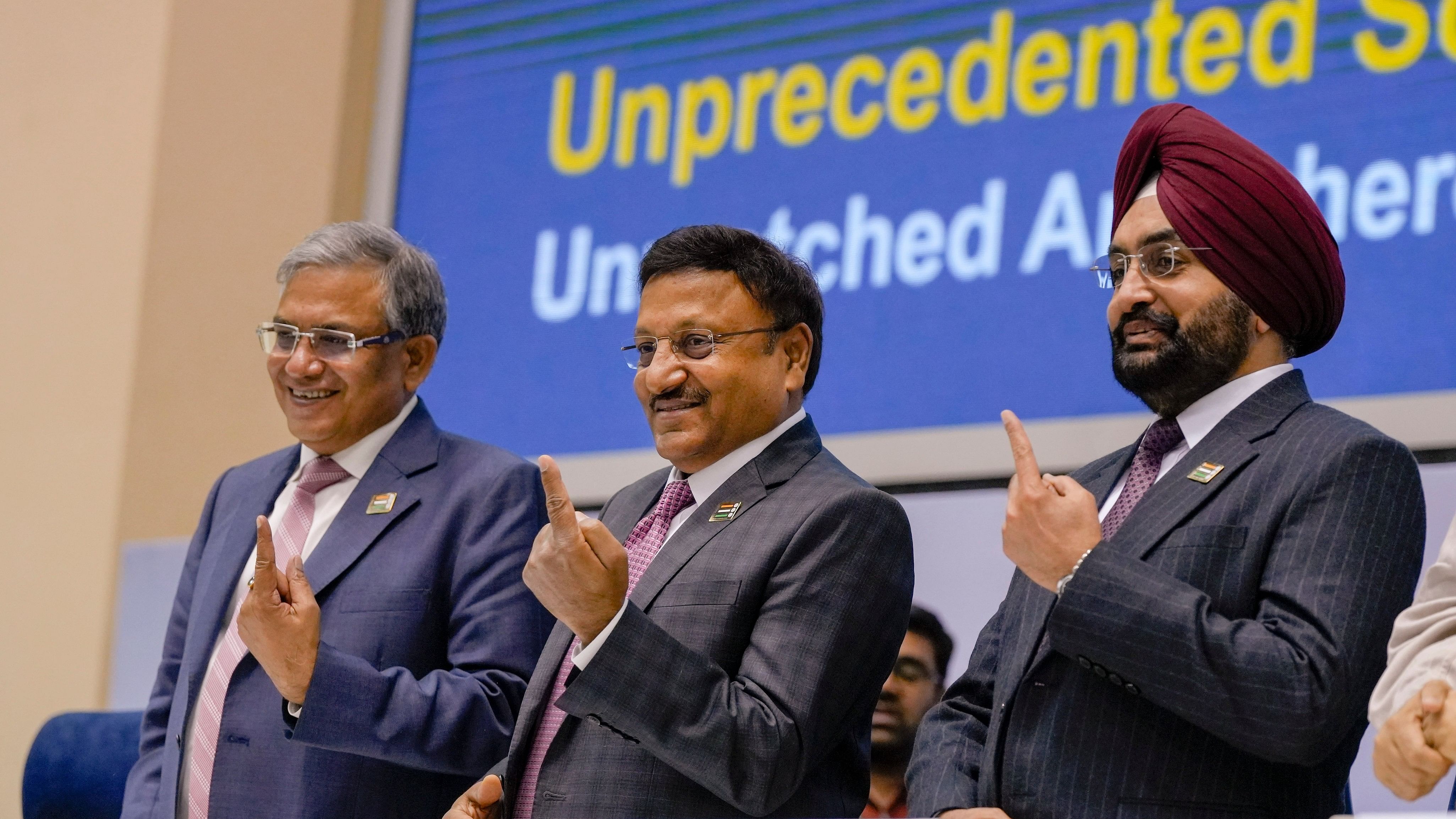
New Delhi: Chief Election Commissioner Rajiv Kumar with Election Commissioners Gyanesh Kumar and S.S. Sandhu during announcement of the schedule for General Elections 2024, and elections to the Legislative Assemblies of Andhra Pradesh, Sikkim, Arunachal Pradesh and Odisha, in New Delhi, Saturday, March 16, 2024.
Credit: PTI Photo
New Delhi: Around 97 crore Indians will queue up to vote in Lok Sabha elections in seven phases between April 19 and June 1, in what is the longest cycle of polling in a general election after the first one in 1951-52.
Elections to four state Assemblies of Andhra Pradesh, Odisha, Sikkim and Arunachal Pradesh will also be held along with the Lok Sabha elections but the much anticipated announcement on holding Jammu and Kashmir state polls did not take place owing to security and administrative reasons.
The elections to two seats in ethnic-strife torn Manipur will be held in a single phase but in two days in one of the constituencies. Along with these polls, bypolls to 26 Assembly seats in 13 states, including in Karnataka, would also be held.
The counting of votes will be held on June 4. The Model Code of Conduct has come into place, which will be for 80 days if it is lifted on the counting day, the longest in the country’s electoral history.
The Lok Sabha voting will be on April 19, April 26, May 7, May 13, May 20, May 25 and June 1. Bihar, West Bengal and Uttar Pradesh will vote in all seven phases while Maharashtra and Jammu and Kashmir will go to polls in five phases.
Karnataka will go to polls in two phases on April 26 (phase 2) and May 7 (phase 3) while Tamil Nadu and Telangana will go to polls on April 19 (phase 1), Kerala April 26 (phase 2), Delhi May 25 (Phase 6) .
The highest number of 102 constituencies going to polls will be in phase 1 while the lowest is in phase 5 when 49 seats will see voting.
In the Assembly polls, Arunachal Pradesh and Sikkim will vote on April 19 while Andhra Pradesh polling will be on May 13. Odisha will have a four-phase poll on May 13, May 20, May 25 and June 1.
Announcing the poll schedule, Chief Election Commissioner Rajiv Kumar told a press conference that the EC would strictly tackle the “four ‘M’ – muscle power, money power, misinformation and Model Code of Conduct violations”.
He said the EC will have a “calibrated” approach to MCC violations while appealing to parties to maintain decorum and refrain from personal attacks during campaigning. The press conference was attended by two new Commissioners Gyanesh Kumar and Sukhbir Singh Sandhu, who assumed office on Friday.
He said 96.8 crore people – 49.72 crore men and 47.1 crore women – are eligible to vote. Out of this. 1.82 crore, including 85 lakh women, are first time voters. Among the voters, 85 lakh are aged above 85 years while the number of voters with disability are 88.4 lakh. A total of 2.18 lakh centenarians are voters.
In what is seen as a positive development, Kumar said the gender ratio among electors has improved significantly to 948. There are 12 states which had more women voters than men, he said.
This will be for the first in Lok Sabha election history, those above 85 years and those with more than 40% disability will be allowed to vote from home. In recent Assembly elections, the EC had rolled out this facility and is now being extended to the general elections.
